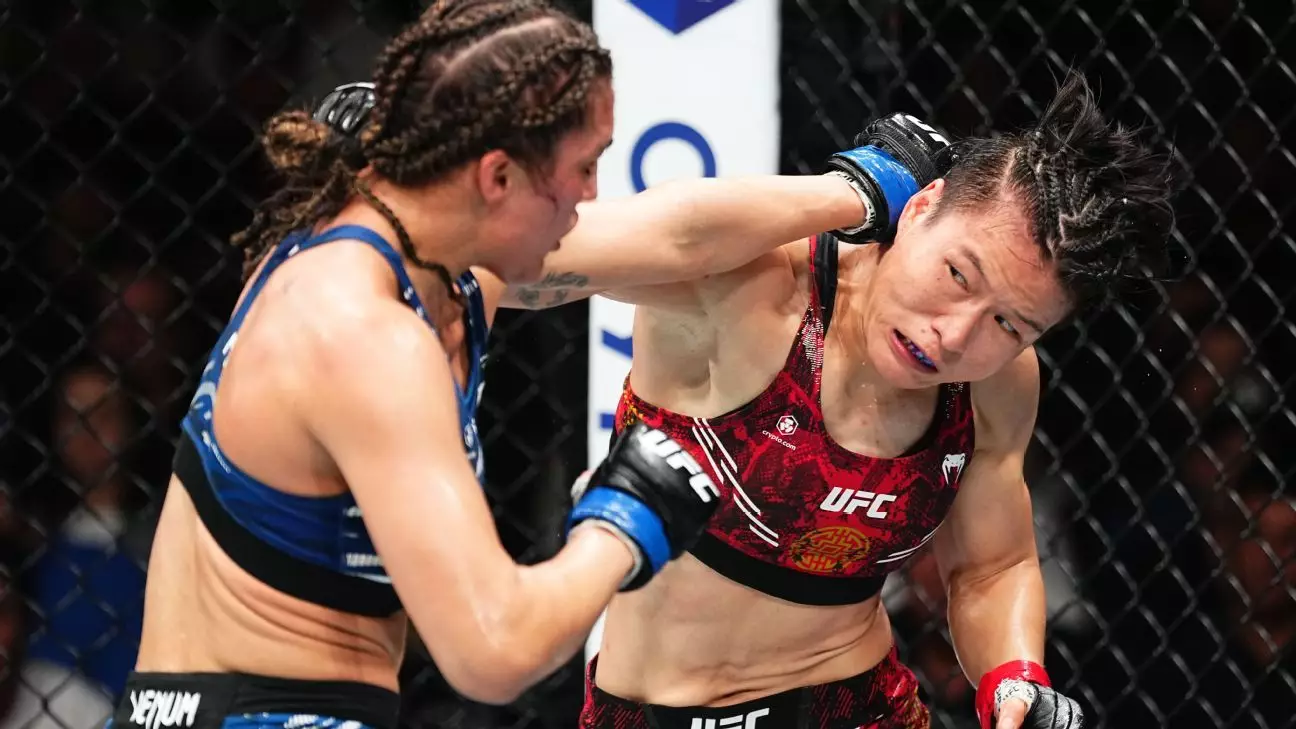In a mesmerizing display of mixed martial arts skill, Zhang Weili successfully defended her women’s strawweight championship against the formidable Tatiana Suarez at UFC 312, held at the Qudos Bank Arena in Sydney. This matchup, fierce in anticipation, featured one of the most noteworthy champion versus challenger narratives in recent UFC history. Zhang, who hails from Beijing and boasts a professional record of 26 wins and 3 losses, entered this fight as an underdog despite her illustrious track record.
Zhang’s previous title defenses included dominant victories over top-tier fighters like Carla Esparza, Amanda Lemos, and Yan Xiaonan, setting high expectations for her latest bout. The matchup against Suzuki was touted as a true test of her champion status, especially considering the latter’s undefeated streak (11-0) and her notable wrestling accolades, including winning Season 23 of “The Ultimate Fighter.” The stakes were high; however, the narrative quickly shifted as the fight unfolded.
From the outset, Zhang demonstrated superior tactical mastery. Although Suarez aimed to capitalize on her wrestling background, Zhang effectively neutralized her takedown attempts, thwarting 14 out of 15. Instead, what began with a brief grappling exchange quickly morphed into a striking clinic, with Zhang showcasing her superior ability to control the octagon. By outstriking Suarez 251-61, Zhang not only defended her title but also displayed a graphic representation of her striking prowess.
She started strong, showcasing not just the striking techniques seen in her previous bouts, but remarkably intelligent game planning. After an early grappling exchange, Zhang regained her footing and switched to striking once she read Suarez’s movements. The highlight was a powerful right hand that left Suarez visibly shaken. This nuanced shift from grappling to striking underscored Zhang’s versatility and preparedness, showcasing her as not just a champion, but a complete fighter.
The championship rounds revealed the diverging conditioning and ring awareness of the fighters. Zhang, at 35, utilized her experience to dominate the latter half of the fight, leaving Suarez struggling to change tactics or find a second wind. Her over-commitment to takedowns became evident as she continued to chase the elusive champion, ultimately playing into Zhang’s strengths. Without a backup plan, Suarez found herself stuck in a loop of predictable movements, which Zhang exploited masterfully.
UFC President Dana White later lauded Zhang’s performance, stating, “When you look at Weili, she’s one of the greatest of all time.” His comments highlighted the gap not only in skills but in adaptability under pressure, a testament to Zhang’s comprehensive fight IQ.
As the dust settles from this remarkable title defense, Zhang’s journey does not appear to be pausing. Talks of her moving up in weight class to challenge for the flyweight title with Valentina Shevchenko have surfaced, potentially igniting another sensational chapter in her career. This ambition underscores Zhang’s desire to cement her legacy further and gain recognition as a two-division champion.
White’s ambiguous remarks regarding Shevchenko’s current ranking in the pound-for-pound discussion only add fuel to the excitement surrounding potential future matchups. The landscape of women’s MMA continues to evolve, and Zhang, as a defining figure, is at the forefront leading that transition.
As Zhang Weili continues her reign as strawweight champion, her trajectory seems unbound by limits, characterized by strategic intelligence, fierce athleticism, and unwavering resolve.Her performance at UFC 312 not only solidified her victory over Tatiana Suarez but also elevated her status among the greatest fighters in MMA history. The conversations surrounding her next moves promise to keep the excitement alive in the sports community. Whether she stays at strawweight, continues to defend her title, or ascends to flyweight, Zhang’s legacy is being etched into the canvas of MMA with each fight, further demonstrating why she is recognized as a dominant force in the sport.

